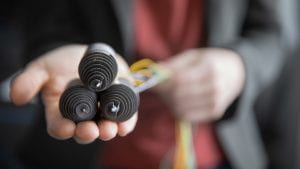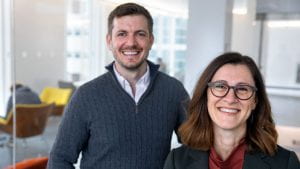This story originally appeared in the online-only spring 2020 issue of Ezra magazine.

Taryn Bauerle had a problem.
Bauerle, associate professor of horticulture in the College of Agriculture and Life Sciences’ School of Integrative Plant Science (SIPS), studies how root systems respond to thirst. It’s a critical area of research: Better understanding roots will help breed new drought-resistant crops, which are sorely needed to meet the global challenges of climate change, food shortages and population growth.
But digging into the ground to observe roots inevitably disrupts their environment, disturbing microorganisms and fungi, and even risks cutting into the roots themselves.
For years, Bauerle tried to work around the limitations of existing tools. Last year, while brainstorming with Johannes Lehmann, professor of soil sciences in SIPS, she had a different idea. “We quickly realized we needed a new approach,” she says, “and then we thought: Why not use biomimicry to develop some new tools?”

The team, which now includes researchers in SIPS and the College of Engineering, is developing earthworm-shaped robots that can burrow into the soil with minimal disturbance. The project received a grant from the Cornell Initiative for Digital Agriculture, which supports radical collaborations aimed at solving agri-food challenges. “Nature has been trying to solve problems for a long time, so we’re copying what nature is already improving,” Bauerle says.
The robots, designed by Robert Shepherd, associate professor in the Sibley School of Mechanical and Aerospace Engineering, will be equipped with water-detecting sensors designed by Abraham Stroock ’95, the Gordon L. Dibble Professor and William C. Hooey Director of the Smith School of Chemical and Biomolecular Engineering.
Lehmann will explore new ways to measure soil carbon forms, and Michael Gore, Ph.D. ’09, associate professor of molecular breeding and genetics for plant quality, a Liberty Hyde Bailey professor and international professor of plant breeding and genetics, will work on initial phenotyping characterizations, to help measure plants’ properties in real time.
“It couldn’t be a better team,” says Bauerle, who brings her own expertise in root systems and below-ground plant growth. “Cornell makes it so easy to just go knock on other faculty’s doors, and everybody is always very welcoming. The innate culture that we have on this campus is that people look forward to crossing boundaries and trying new things. And I think that’s why we succeed.”


